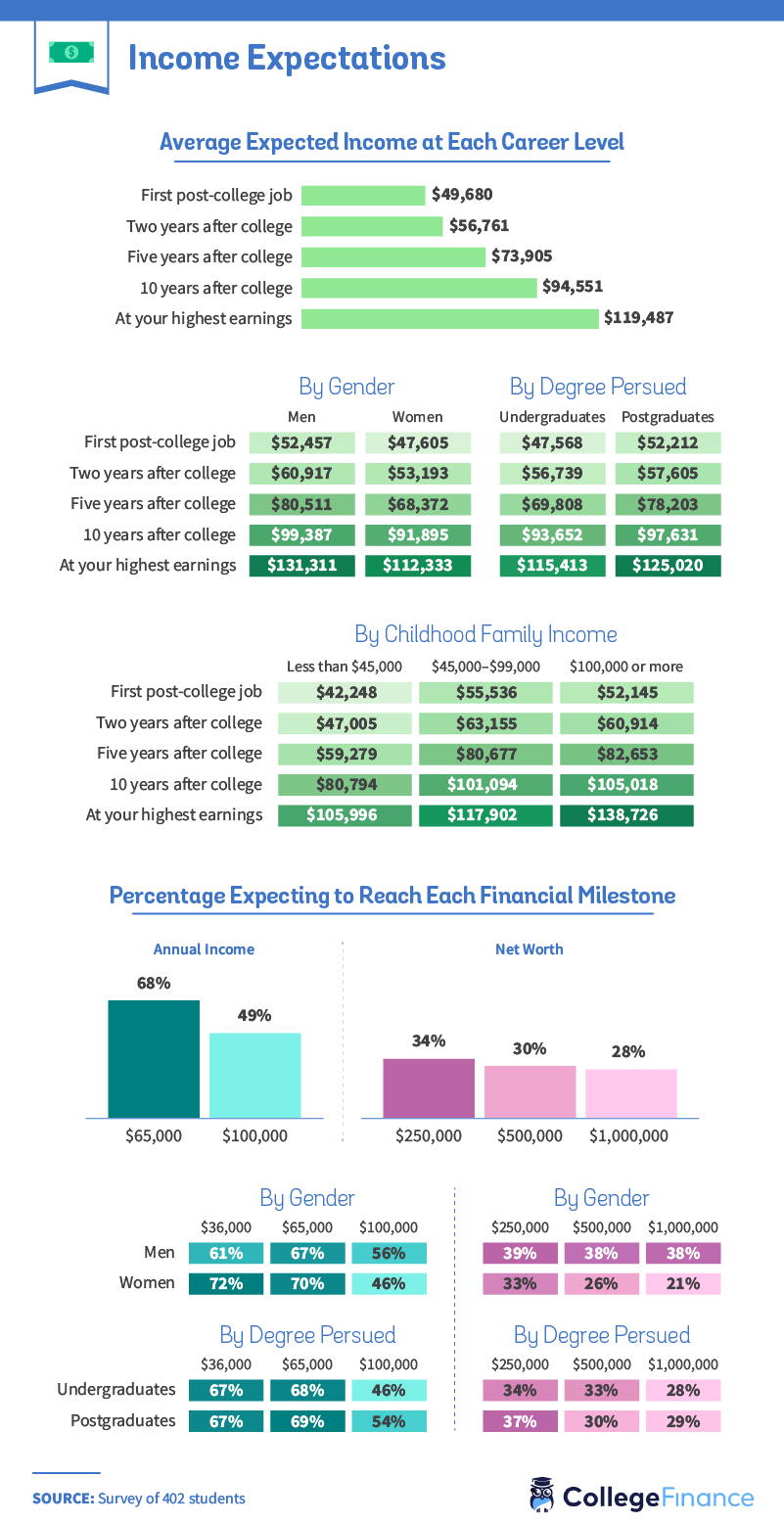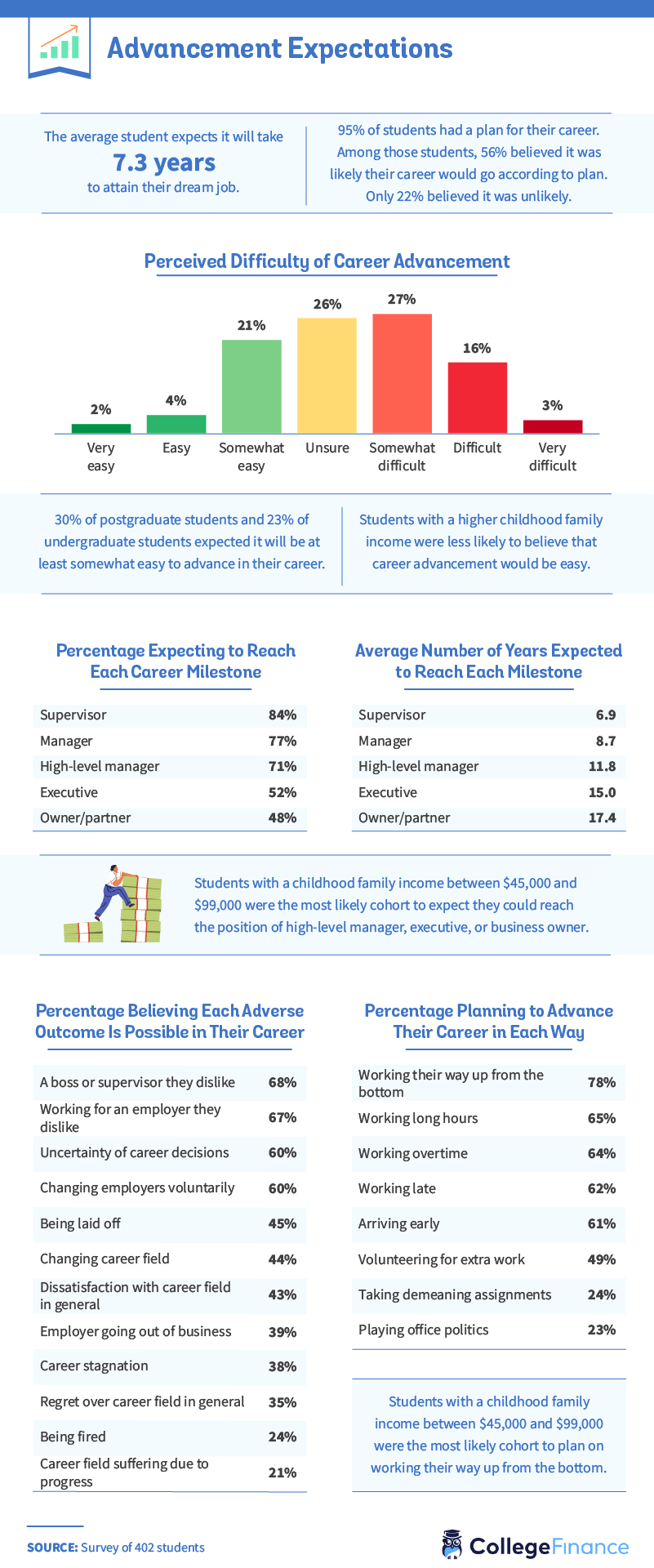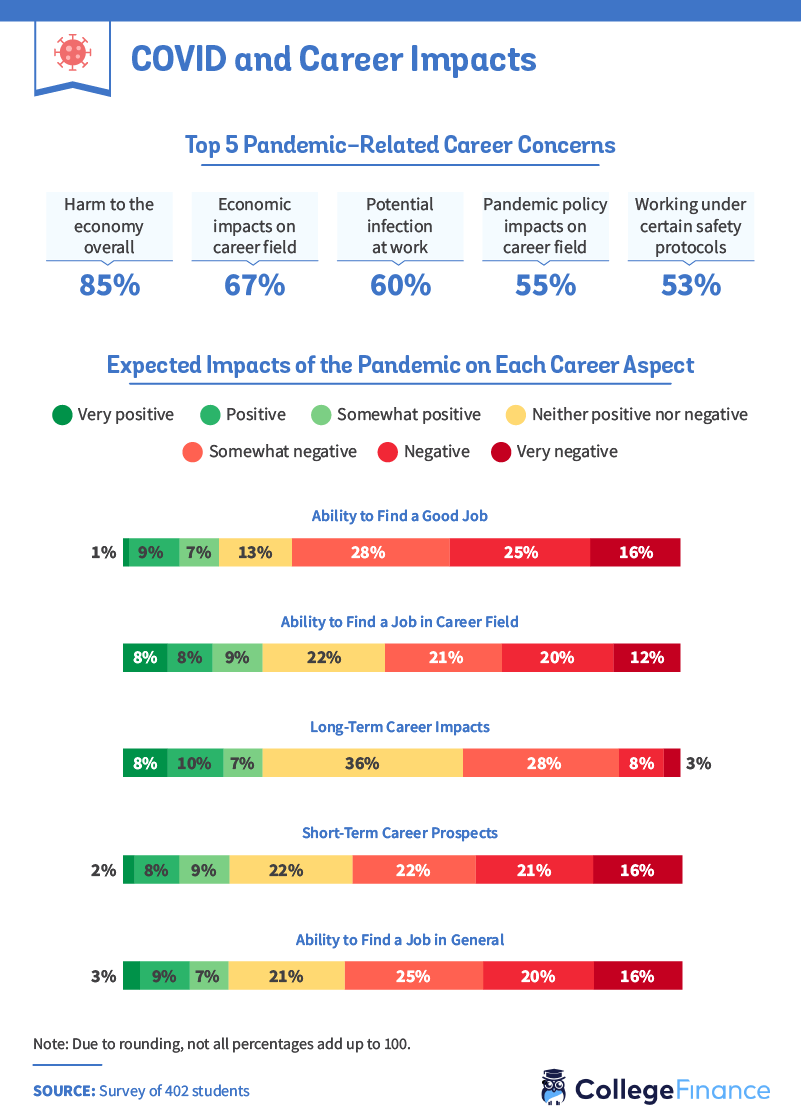Wide-eyed, bushy-tailed, right-out-of-college graduates have long left their lecture halls and entered the working world with unrealistic expectations. No matter the warning signs passed along the way, most graduates view a bachelor’s degree as a one-way ticket to success. But the tails of Harvard alums skipping entry-level positions and landing on a six-figure salary are far from reality. And believing the fairytale can end up hurting their career in the long run.
Despite constant warnings of a rockier path ahead – especially post-pandemic – are college students still looking to the future with high hopes? How much do they expect to make right out of the gate, and how do expectations vary by major? To find out, we surveyed 400 students, gathering their take on the post-college working world. Read on to see what they said.
Hope for the Best, Expect the Acceptable
To kick things off, we explored students’ ambitions for their first post-college employment opportunities.

Considering entry-level job postings are down by nearly 70% due to the pandemic, the post-college motto seems to be “aim high, expect low.” While most soon-to-be grads planned on aiming for a professional-level job in their field, they expected entry-level jobs more than any other position. Along the same lines, only 3% and 2% of students were aiming for internships and part-time jobs, respectively, while 13% and 15% expected to attain those positions.
These sentiments were shared between men and women, with men only slightly more likely to expect professional-level and entry-level jobs than their female counterparts. On the other hand, women were somewhat more likely to have lower expectations, thinking they would attain an internship or part-time job more than men.
However, childhood family income may have a more significant impact on future expectations – in a surprising way. Students who grew up in a household with an income of $100,000 or more were the most likely to expect to attain an entry-level job. In contrast, students growing up in a household bringing in under $45,000 were the most likely to expect to land a professional-level job.
Dreaming Big
If childhood family income had a long-term impact, what about students’ personal desires? Do childhood dreams of ideal jobs carry over to post-college life?

Despite younger generations becoming increasingly pessimistic about their life, soon-to-be grads are significantly more optimistic about their post-college career. Seven percent of students believed attaining their ideal post-college job was very likely, while 23% and 28% said it was likely and somewhat likely, respectively.
However, the degree pursued and childhood family income also had a significant impact on beliefs. Postgraduate students were 11 percentage points more likely than undergraduate students to believe they’d attain their ideal post-college job. And this time, students coming from wealthier backgrounds were the most optimistic: Compared to 55% of students from childhood family incomes of under $20,000, 64% of those coming from homes bringing in $100,000 or more were confident they’d land their ideal job.
While students had high expectations about finding their ideal job, they were pretty realistic when it came to how long it would take. On average, students expected it to take six months before they found a job in their field of study, but it can take as little as three months in reality. Of course, the type of job students go after and their degree can change everything. Fortunately, a whopping 88% of students kept realistic expectations, feeling confident in attaining a part-time job. In contrast, only 39% felt the same about attaining a professional-level position in their field.
Making Money Moves
Finding a job is just the first hurdle for post-college graduates, though. Matching that job with a good salary is challenge number two.

High salary expectations can make for a rude awakening once graduates begin the interviewing process. While average salaries straight out of college range from under $40,000 to over $69,000 depending on degree earned, students expected to make $49,680 in their first post-college job, on average. Two years after college, their expected average wage jumped to $56,761, which was expected to double by the time they reached their highest earnings.
In line with reality, postgraduate students expected to make more in every stage of their post-college career. Unfortunately, a persisting gender pay gap means the same for expectation differences between men and women. While women expected an average starting salary of $47,605, men expected to make an average of nearly $5,000 more immediately after college. And in the long run, men still expected to make roughly $19,000 more at their highest level of earning.
Taking expectations to the next level, 28% of students expected to reach a net worth of $1 million at some point in their careers, with postgraduate students and men more likely than their counterparts to report as much.
Climbing the Career Ladder
Reaching that million-dollar mark means climbing the career ladder and having a plan in place to do so.

College students may be confident in attaining their dreams, but they seem to know it doesn’t happen overnight. On average, students expected it to take 7.3 years before they’d land their dream job, and 95% of students had a plan to get them there. Students were also realistic in understanding how hard career advancement was going to be. The majority of students said they were either unsure of the difficulty or admitted it would be at least somewhat difficult to climb the ladder.
Along the way, 84% of students expected to reach the supervisor level, while 77% and 71% expected to reach manager and high-level manager, respectively. Just over half believed they would become an executive at some point in their career, and 48% said they’d be an owner or partner. Again, students’ expectations of how long it would take to reach each respective milestone were in line with reality. With an average of 6.9 years, students believed a supervisor role was the quickest to reach, whereas getting to the owner or partner stage would take an average of 17.4 years.
Students were also willing to face the likelihood of challenges throughout their careers. Considering 76% of job seekers have reported their boss to be toxic, college students accurately expected to come across a boss or supervisor they dislike. Working for an employer they dislike, uncertainty about career decisions, and changing employers voluntarily were also challenges the majority believed to be possible at some point in their careers. Fortunately, the majority also had a plan: 78% said they planned to work their way up from the bottom; 65% said they planned to work long hours; and 64% planned to work overtime.
Coronavirus Career Concerns
With or without a career plan in place, nothing could have predicted a pandemic was on the horizon.

Students graduating in 2020 or 2021 likely had different expectations regarding their postgraduate careers when they first enrolled. During their time in school, the entire world around them shifted, tanking the economy and gaining them millions of job market competitors. But working under safety protocols or the impacts of pandemic policy on their field was of lesser concern (granted, over half did share those concerns). Instead, a whopping 85% of students surveyed named the overall harm to the economy as their most significant pandemic-related career concern.
With young workers already hit the hardest by the pandemic, it’s not surprising the majority of soon-to-be grads expect the pandemic to impact their ability to find a good job negatively. Along the same lines, 28% of students expected the pandemic to have long-term career impacts that were somewhat negative, as well.
Planning for Possibilities
Finding a job is a job in itself. But add a pandemic, collapsing economy, and an overabundance of job seekers to the mix, and soon-to-be college graduates may have some rough roads ahead. Fortunately, the majority have scaled back the typical fairytale expectations and accepted that finding a job during these times won’t be that easy. They’ve also faced the reality that the jobs and salaries they aim for are likely not the jobs and wages they will get. Nevertheless, the new professionals entering the job scene are about to start their journey – and they have a plan to make it to the top.
No matter where you are on your professional or educational journey, College Finance can help you get the most out of your college investment. Whether you need to refinance existing loans, search for scholarships, or compare private student loan options, we can help you find the best options. Learn more about us at CollegeFinance.com.
Methodology and Limitations
For this study, we surveyed 402 students currently enrolled and pursuing an undergraduate or postgraduate degree. Among our respondents, 183 were male, 212 were female, and seven did not identify as male or female.
To help gather and report accurate data, all respondents were required to identify and correctly respond to a decoyed attention-check question. In some cases, questions and answers have been rephrased for clarity or brevity. These data rely on self-reporting, and potential issues with self-reported data include, but are not limited to, telescoping, selective memory, and attribution errors.
Fair Use Statement
Entering the workforce can be scary for post-college graduates, but knowing they’re not alone can ease anxiety. If you know someone who could benefit from our findings, feel free to share this project for noncommercial purposes. All we ask is that you include a link back to this page so our contributors receive proper credit.


